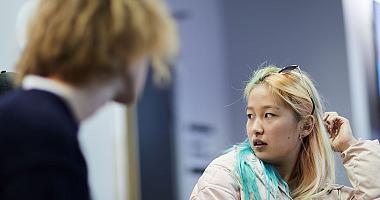MA Filmmaking (Editing)
Content navigation menu
Why study MA Filmmaking (Editing) at Goldsmiths
This Masters will enhance your narrative skills as an editor of fiction for film and television.
- This Masters is a pathway of MA Filmmaking, so that in addition to your specialised training you will collaborate with students across all specialisms on a variety of film projects.
- Experienced tutors and guests provide expert guidance designed to enhance the flow of your individual research, experimentation and artistic achievement.
- You will complete your degree by working in your specialist role on a major production in the final term.
- The programme is housed in a new purpose-built media facility equipped with state-of-the art teaching spaces including a film studio equipped with Arri lighting and Green Screen facilities.
- Goldsmiths is an Avid Learning Partner offering Editing students accredited training in Media Composer and the opportunity to certify as an Avid Media Composer Specialist. Edit suites, screening rooms and sound studios are linked via Avid’s industry standard NEXIS storage area network.
- You will work to professional standards using high-end digital formats. You will also learn sophisticated postproduction workflow techniques, gaining a wealth of experience in off-line editing and an understanding of how this fits in with on-line editing, visual effects and picture grading.
- In addition to your specialist area, you can attend classes in related disciplines. This framework is designed to stimulate collaborative practice by providing you with a breadth of filmmaking knowledge combined with a high level of expertise in your chosen filmmaking discipline.
Contact
If you have specific questions about the degree, contact Femi Kolade or Raluca Petre.
Length
1 year full-time
Entry requirements
You should have (or expect to be awarded) an undergraduate degree of at least 2:2 standard in a relevant/related subject. You might also be considered if you aren’t a graduate or your degree is in an unrelated field, but you have relevant experience and can show you can work at postgraduate level.
Fees
Home - full-time: £17000
International - full-time: £32000
School
Expert guidance
Tutors on the MA Filmmaking course have a wealth of experience in the film and television industry. We maintain close links with the industry – the editing department has, for the last few years, had a strong relationship with the Guild of British Film and Television Editors who have provided mentors for our students.
The Department of Media, Communications and Cultural Studies has been ranked second in the UK for 'world-leading or internationally excellent' research (Research Excellence Framework, 2021) and 16th in the world (third in the UK) in the 2024 QS World Rankings for communication and media studies.
What you'll study
You will take the following modules:
| Module title | Credits |
|---|---|
| Editing: Specialist Skills | 60 credits |
| Final Project | 60 credits |
Your final project will be assessed by a portfolio of work and a viva that reflects your practice.
Note about optional modules (if available): The above is indicative of the typical modules offered, but is not intended to be construed or relied on as a definitive list of what might be available in any given year. The module content and availability is subject to change.
Overview
For two terms you will spend a full day a week in specialised contact with your specific programme convenor. These sessions include:
- Practical demonstrations and exercises
- Lectures
- Screenings
- Small group seminars
- Workshops
You will also take three optional modules, taught through practical workshops and hands-on experiences, as well as critical discussion and essay writing.
The third term will be taken up with your substantive Final Project and you will take part in a series of progress and feedback meetings.
Group film projects
You will work with other students from across the five MA Filmmaking fiction pathways to create film crews in a professional structure.
This allows you to develop realistic industry experience while making work with extremely high production values.
What our students say
"The degree was the first time that I studied and socialised with very like-minded students. The facilities were fantastic, and the teachers were highly skilled and had in-depth knowledge about the industry."
"It’s not just about planning sophisticated camera moves or complex editing; its about linking creative techniques to telling a powerful story in ways that people can experience for themselves and literally ‘feel’."
Entry requirements
You should have (or expect to be awarded) an undergraduate degree of at least second class standard in a relevant/related subject as well as a level of practical experience from work in the arts or the media.
You might also be considered for some programmes if you aren’t a graduate or your degree is in an unrelated field, but have relevant experience and can show that you have the ability to work at postgraduate level.
Because funding deadlines and requirements vary around the world, applications are considered on a rolling basis from February onwards and places on the programme fill up across the recruitment cycle. For this reason, we strongly advise you to submit your completed application as early as you can.
International qualifications
We accept a wide range of international qualifications. Find out more about the qualifications we accept from around the world.
If English isn’t your first language, you will need an IELTS score (or equivalent English language qualification) of 7.0 with a 7.0 in writing and no element lower than 6.5 to study this programme.
How to apply
Apply directly to Goldsmiths using our online application system
You apply directly to Goldsmiths using our online application system.
Before submitting your application you’ll need to have:
- Details of your academic qualifications
- The email address of your referee who we can request a reference from, or alternatively a copy of your academic reference
- Copies of your educational transcripts or certificates
- A personal statement – this can either be uploaded as a Word Document or PDF, or completed online. Please see our guidance on writing a postgraduate statement and ensure that you answer the following questions in your statement:
- Tell us about your passion and aptitude for filmmaking
- What are your dreams and aspirations?
- How did your engagement with visual media develop, and how has it developed in terms of professional, voluntary and personal work?
- Examples of your recent work in a related field (eg moving image samples), preferably via a web link to your online portfolio – please upload this under 'additional' in your online application (NB the maximum file size you can upload is 20MB)
- IELTS 7.0 at the point of application (if you are from a non-majority English-speaking country)
- Download and complete the Editing questionnaire (Word)
You should emphasise your practical/theoretical experience in the arts or the media in your application.
You'll be able to save your progress at any point and return to your application by logging in using your username/email and password.
References
Our departmental preference is for referees to upload a confidential reference to the on-line admissions system. Please make sure to select the option for your referees to be automatically notified of the need for them to submit a reference on your behalf.
When to apply
We accept applications from October for students wanting to start the following September.
Application deadline: 26 May
Applications are considered from February onwards and are only considered when complete; we strongly recommend applying as early as you are able to, as decisions will take longer the later in the year you apply.
We will only be able to consider late applications if there are vacancies remaining. Please note, assessment of MA Filmmaking applications can take several months as there are a limited number of places on the programme. Due to the unique selection process, we ask that all applicants wait to be contacted by the Admissions Team regarding their application.
We encourage you to complete your application even if you haven't finished your current programme of study. It's very common to be offered a place that is conditional on you achieving a particular qualification.
If you're applying for funding and have an early deadline, please apply as early as possible and get in touch to let us know your funding deadline.
Selection process
Admission to many programmes is by interview, unless you live outside the UK. Occasionally, we'll make candidates an offer of a place on the basis of their application and qualifications alone.
Please be aware that this pathway of MA Filmmaking tends to be heavily subscribed, so you are encouraged to apply for more than one pathway to increase your chances of being offered a place. Please indicate in your personal statement your preferred pathway.
Find out more about applying.
Fees and funding
Annual tuition fees
These are the PG fees for students starting their programme in the 2025/2026 academic year.
- Home - full-time: £17000
- International - full-time: £32000
If your fees are not listed here, please check our postgraduate fees guidance or contact the Fees Office, who can also advise you about how to pay your fees.
It’s not currently possible for international students to study part-time under a student visa. If you think you might be eligible to study part-time while being on another visa type, please contact our Admissions Team for more information.
If you are looking to pay your fees please see our guide to making a payment.
Funding opportunities
Explore the Goldsmiths scholarships finder to find out what funding you may be eligible for.
Paying your fees
Find out about paying your tuition fees.
If you are a UK student you may be eligible for a postgraduate loan.
Meanwhile our Careers Service can also offer advice on finding work during your studies.
Additional costs
In addition to your tuition fees, you'll be responsible for any additional costs associated with your course, such as buying stationery and paying for photocopying. You can find out more about what you need to budget for on our study costs page.
There may also be specific additional costs associated with your programme. This can include things like paying for field trips or specialist materials for your assignments. Please check the programme specification for more information.
Student work
Watch the trailer of Lula, an award-winning short film directed by Aoife O'Kelly and produced by Sara Kurp, both MA Filmmaking students.
Short film, Lula
Careers
Where this degree can take you
On completing the programme, you will be equipped to enter the global job market, armed with an enhanced understanding of your practical, intellectual and creative capacities as a film editor.
Possibly the most important skill we furnish you with is the rigorous discipline of working collaboratively under pressure as part of a creative team on challenging projects not only in film and television, but also in online, web, multi-media, animation, games and other hybrid forms.
In addition to your practical filmmaking skills, we enable you to develop a variety of transferable intellectual, organisational and communication skills to equip you for a broad range of employment opportunities across the arts and media landscape (film, television, online, the creative arts, advertising and related hybrid forms).
Our graduates
Our alumni are active in the film, media and cultural industries around the world as fiction and documentary editors.
If you are passionate about fashioning an exciting career for yourself as an editor in an environment that promotes innovative filmmaking, this course is for you.
Find out more about employability at Goldsmiths.





